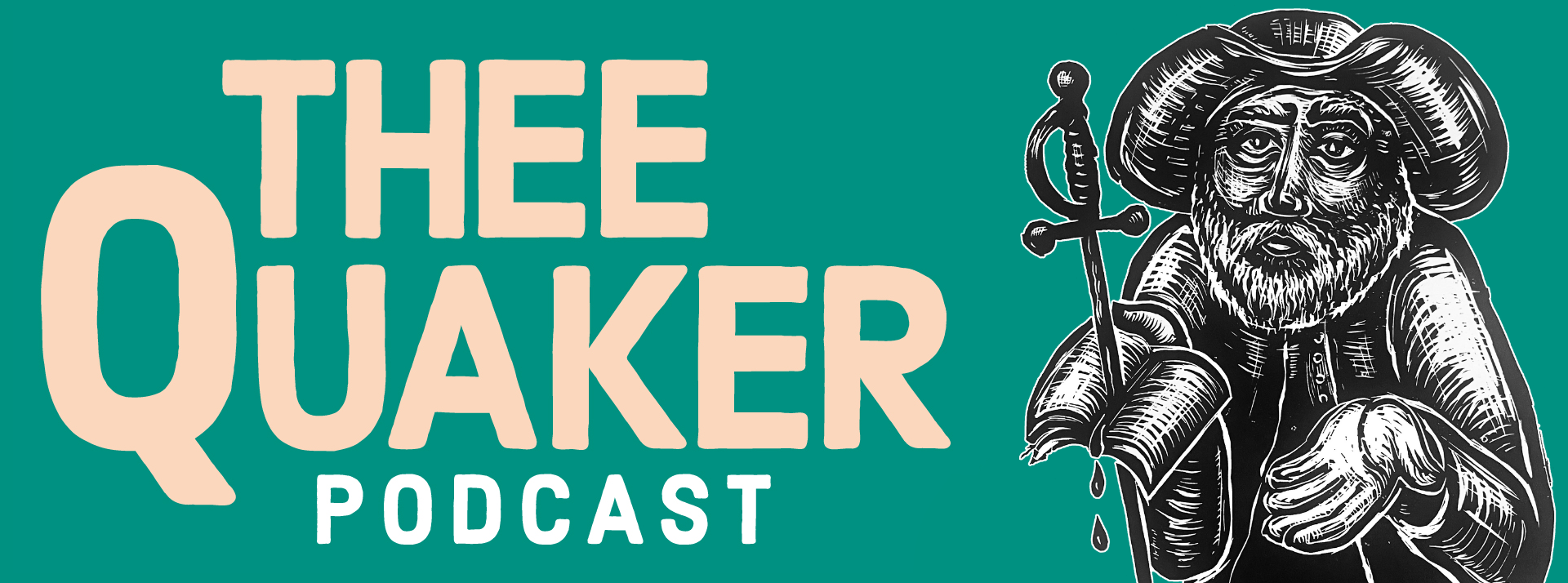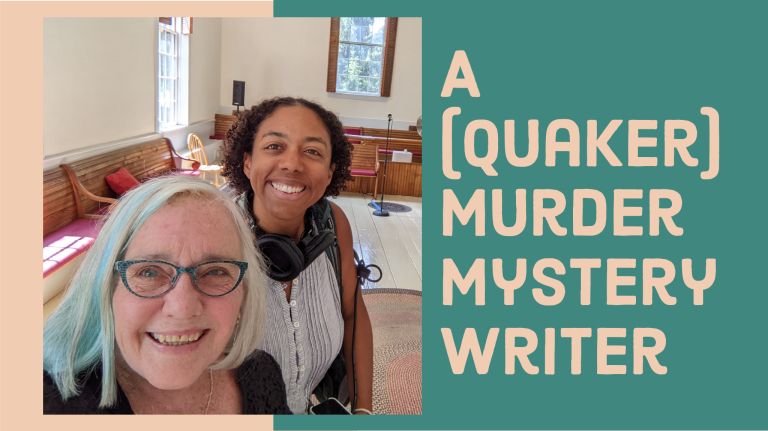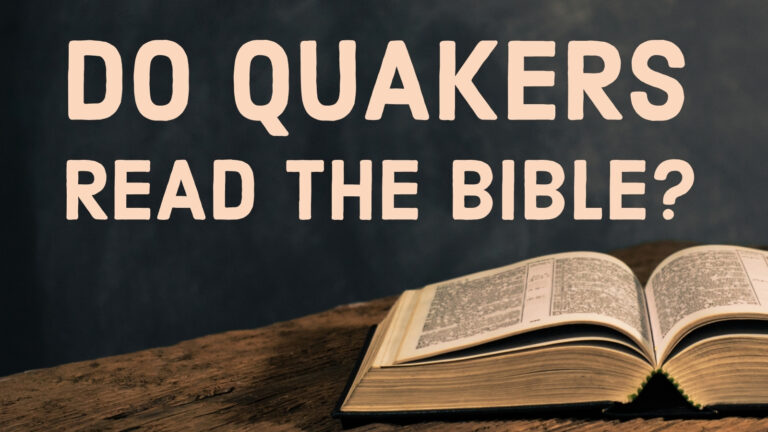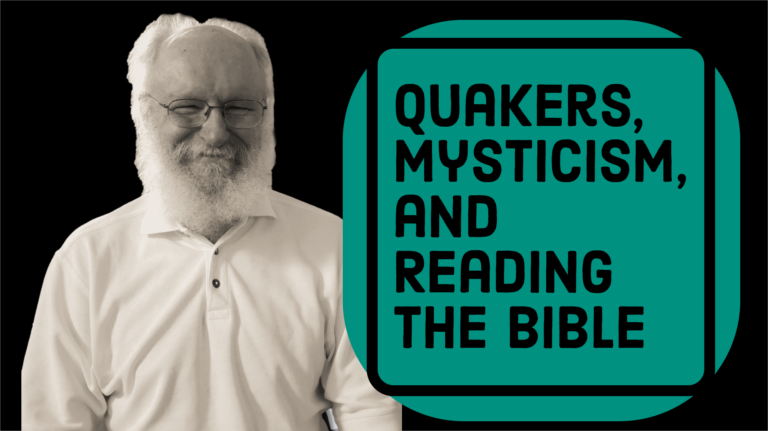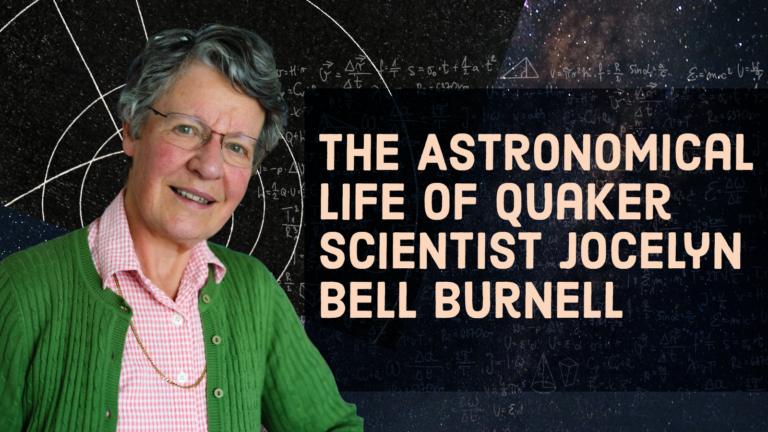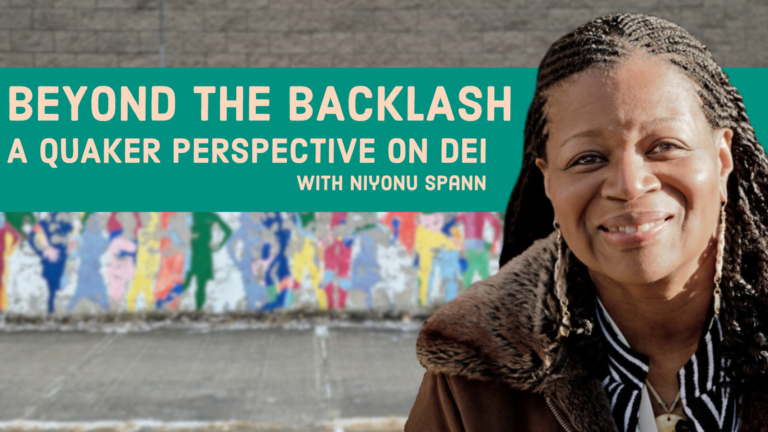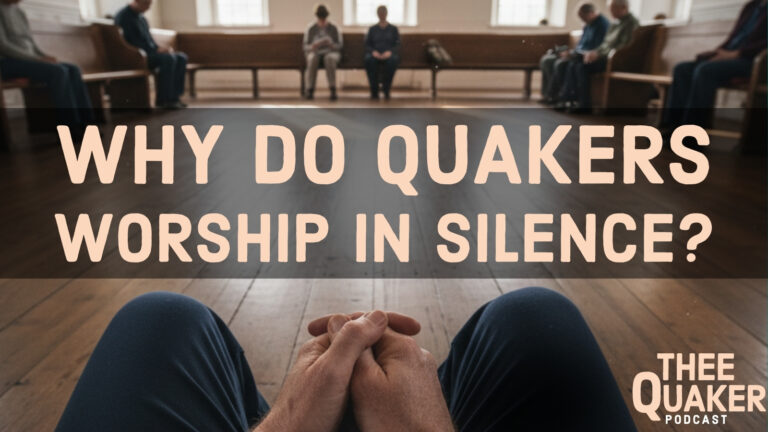David LaMotte: Quaker Musician and Hope-Monger
Despair doesn’t serve the world, but neither does cheap hope. So what’s the alternative? Join Quaker musician and author David LaMotte on a journey from smoky bar gigs to the silence of a Quaker meeting to discover a powerful vision of “grounded hope” that confronts the myth of powerlessness. Stick around for profound insights and two live song performances that will leave you feeling a little less alone and a lot more capable of changing the world.
Subscribe so you don’t miss an episode!
Leave a comment below to share your stories and thoughts!
Discussion Questions
- David notes that people spend time talking about God and to God, but almost no time listening for a response. What does “listening for the still small voice” mean to you, and what helps you get into a posture to listen?
- How does David’s concept of “grounded hope” as an “orientation of the Spirit”, rather than optimism, change the way you think about navigating despair or difficult times?
- David prefers the word “harmony” over “unity,” defining it as different people or ideas resonating together to create something beautiful without demanding sameness. Where could your community benefit from seeking harmony instead of unity?
Zack Jackson
Before we begin today’s episode, I just wanted to share some wonderful news. Last week, we decided to extend our supporter drive for one more week to try to make that final push to 100 new supporters, and yall showed up!
I am so deeply grateful to everyone who helped us to hit our goal. Your support is what keeps this podcast going and allows us to continue sharing these stories. From the bottom of my heart, thank you for being part of this community.
If you are a new or sustaining supporter of at least $10/month, we will be in touch shortly about when you can expect your new Benjamin Lay mug to arrive. Thank you so much. And now, here’s the show…
Jon Watts
Hey there Zack.
Zack Jackson
Hey, Jon, how’s it going?
Jon Watts
Oh, not too bad. And actually, that was, that’s what I was going to ask you. You know, we’re two months into the third season of the podcast. How’s everything going? How’s your work life balance?
Zack Jackson
What a unique question. I think it’s a healthy mix. I hesitate. It’s just hard to say, because this is the kind of work that you can’t just clock out of. Like, the stories that I’m working on tend to stick in my head, rolling them over and over and over, like, for every half hour episode that we launch, I probably have like, five hours of conversation that I’ve had with just the most incredibly fascinating people. So there’s just, there’s so much that happens under the surface, right?
Jon Watts
Well, you know, the best art is art that works on the artist first and then the audience. So I appreciate that you’re sort of wrestling with these big questions even even in your off time, you know, and you’re doing a terrific job. I was just poking around the numbers, and it looks like September is the biggest month in terms of downloads for the podcast so far. So yeah, congratulations.
Zack Jackson
Thanks, Jon. But like I said, the guests that we’ve had have made this a lot easier. It has been such an honor to meet these people from around the world and tell these stories of spiritual courage. You know, I get a lot of emails from listeners who feel powerless and alone these days, and they’re just so grateful to have this digital community. And I wish I could just tell everybody about all of the incredible stories that are coming up later this season, but you’ll have to wait. How are you? How are you doing? I have not seen you much. I know it’s fundraising season and you’re all over the place.
Jon Watts
Yes indeed, this is the time of year where I hit the road and make the case for our organization. You know that Quakers should have this platform in the 21st Century and not hide our light under a bushel. Luckily, that’s not a hard sell. These stories are more important than ever, and most folks I talk to are very supportive. So the big thing that I’ve actually been working on is the launch of our third project. I am really excited to be working with these super talented filmmakers to design and launch a Quaker video project that meets this moment. It’s been a dream of mine for a very long time, and it is so rewarding to see it come to life. If listeners haven’t checked it out yet, that project is now live at Quakervideos.com and we’re releasing a new one every week.
Zack Jackson
Yes, now I know I’m biased, but I loved the Quaker walk to Washington video. I was just so impressed by how much these filmmakers can say without using an overabundance of words. It’s just like they’re able to capture the essence of the story, the heart, the soul, and just kind of let it unfold organically. There’s like this Quaker intentionality to the filmmaking that just feels different than the other stuff that I watch on YouTube. I was just showing somebody the Camp Celo video, and was thinking about how they took this simple story and they created a video that speaks directly to the hope that I want to have for the rest of my life. Like the story is simple, right? There’s a camp. It gets wrecked by a hurricane. People fix it. Sorry, spoilers, but the rebuilding of it is only a small part of the story. Like, it’s about the human spirit. It’s about community. It’s about these stories of an extraordinary faith in an extraordinary time.
Jon Watts
Yeah, I think you, I think you captured it perfectly. You know, in this moment, it’s more important than ever that we be exploring how people of faith and Quakers in particular, are banding together to persevere, to overcome and ultimately to bring about a vision for a better world. Right?
Zack Jackson
It is so easy to focus on the challenges and the bad news than on the possibility?
Jon Watts
Right? Yeah, hope, hope and despair are in tug of war. And in my travels, I talk to a lot of folks, and it’s not hard to see which one of those is pulling harder. But as Quakers, we have inherited this spiritual legacy of working toward a vision for a society built on peace and justice sometimes and maybe especially when that vision seems far fetched or out of reach. That’s exactly why I’m so excited about our guest today. David LaMotte is a Quaker and a musician and an author who has done a ton of thinking about this topic, about hope and despair, about social change, and the role that each of us plays in bringing about a better world, even and maybe especially in dark times,
Zack Jackson
Yes, Yes, all right, let’s get into it.
Jon Watts
David, thank you so much for joining us today. I’m really excited to talk with you. I wonder if we could start with a brief introduction. What’s your name? Where do you live, and what do you do for a living?
David LaMotte
Sure the first two of those are really easy. My name is David LaMotte, and I live in Black Mountain, North Carolina, right outside of Asheville in the Appalachian Mountains, been here for 30 some years. It’s very much home, though. I spend a lot of my life traveling because of my work. So my work is that I make up songs and I write books, and then I travel around to sing the songs for people and talk about the ideas in the books. That’s the easiest summary I can give. I think.
Jon Watts
Thank you. And we’re looking forward to hearing a few of those songs a little later in the episode. I wonder if we could start with a little bit about your spiritual journey, specifically your Quaker story. How did you come to start attending a Quaker meeting? What spoke to you about it?
David LaMotte
So I grew up in a very Presbyterian house, my father and my grandfather and my sister all Presbyterian ministers. I came to Quakerism, mostly through exploring conscientious objection as I approached my 18th birthday, and I came to know some Quakers over the years, and got curious. And the more that I learned about Quakerism, the more I learned about the friends, the more I felt like, oh, well, this is what I always believed. I just didn’t know there were other people who also believed this, and I had the sense that I had kind of found my tribe, and that has never really worn off for me. I’ve felt that way for a lot of years now. So the very first Quaker meeting I ever went to, actually, I won’t say where it was, because I’m going to tell a story that I wouldn’t want anyone’s feelings to be hurt, but I I went to a Quaker meeting that, again, I just deeply resonated with it was the silence was rich for me, and the verbal testimony was rich for me. And so I walked out of that meeting and there was a greeter on the porch who kind of looked like he had just stepped off of the Quaker Oats box, you know, just classic, big old beard and hat and the works and and he was the greeter. And he said, so I believe you’re a guest. Yes, I am. Hi, I’m David. How was meeting for you? And I said, it was really beautiful and rich. And the more I learned about Quakerism, the more I want to get involved. And he responded, huh, well, I don’t know about getting involved. You might want to do some reading. Which threw me entirely. I mean, walk into any faith community all across the south where I grew up, and say, I’d like to get involved, and the answer will be pretty predictable. It’d be great. You know, you can serve on this committee, and you can work with the youth, and we need somebody to do this and that. And at first, you know, at that was, again, rather confronting. But then I, as I sat with it, I thought, Well, what a beautiful thing to say. He’s, you know, this is very, very serious. Take it seriously. Dig in, you know. And I kind of loved that it wasn’t an automatic recruitment, it was a Yeah, okay, glad you’re here now do some reading. And so that was my very first experience of a Quaker meeting. And I thought, yep, these are my people.
Jon Watts
So, something we ask a lot of our guests is, what happens for you in that silence of Quaker, meaning for worship?
David LaMotte
One of the things that I say, whether or not anyone else would describe it this way, is that, at least in my own culture, the one I’m most familiar with, we spend a fair amount of time talking about God and a little bit of time talking to God, and almost no time listening to see if God is saying anything back. You know the biblical phrase. I think it’s Paul who’s talked about the still small voice originally, and Quakers talk about that a lot. I do experience the leading of spirit as still and small, and therefore I have to create space if I hope to hear it. And that’s a lot of what I’m doing. I’m also feeling the presence of the people around me. Because I think spiritual work is inherently communal, whether or not anybody else is in the room. It’s about our connection to each other. Prayer as well as to the Spirit of God, and in some ways that’s redundant in my own theology. So that silence for me is extremely powerful and delicious. And I should say my own meeting for the many last few years, our meeting house was destroyed by Hurricane Helene last almost a year ago, and that’s been hard for the meeting, of course, but that meeting house was on a train track where freight trains come through from time to time, and every once in a while, a freight train would blow right through our meeting it was just a sort of exhilarating, sort of a magical experience. But it was in that meeting that I came to understand the difference between how I conceive of silence versus quiet, because I kind of love that a meeting is never quiet. We show up in our human bodies and they make noises and the chairs squeak and the floor and something goes by outside, and that doesn’t interrupt my silence at all. If I’m centered, that’s all part of the silence, right? Silence, for me, is the choice, and quiet is the circumstance. And so you can have silence on a bus going through a city, if you know how to cultivate that and have worked out that muscle enough. I can’t always do that, of course, but I’ve experienced it. I know it’s possible.
Jon Watts
Yeah. On that note, I know you have a couple of songs to share with us today. I wonder if there are any songs in particular that speak to your practice or faith as a Quaker, or one of those moments that creates harmony on stage?
David LaMotte
Let me see if I can, if I can play this one, it’s from, I’ve got 13 records. This is from the last, I think the one before last, and it’s called Taste the light.
David LaMotte
Open wide and taste the light
falling from the stars tonight.
This cannot be quantified.
Open wide and taste the light.
Lay your cheek against the song.
Let it hold you firm and strong,
ringing like a carillon.
Lay your cheek against the song.
Feel the heartbeat of the drum.
Long ago, this was begun.
We are old too once we’re young.
Feel the heartbeat of the drum.
Drink the notes like drops of wine,
warming, spirit slowing,
Time winding like an arbor vine.
Drink the notes like drops of wine.
Jon Watts
After the break, David opens up about hope, the myth of powerlessness and a song that I think you’re really going to want to hear, stay tuned.
Zack Jackson
On this show, we often talk about what it means to live faithfully in a complicated world, but what happens when you feel spiritually hungry but there’s no community around to feed you. Recently, I had a conversation with a podcast supporter named Jackie Joy. She lives in South Texas on the border, and was feeling weighed down by the anger, division and hopelessness that she saw all around her, she started looking for something else, something that could ground her, both spiritually and relationally. So earlier this year,
Jackie Joy
I was on Tiktok, and there was a couple of people on there who are Quakers. And then I was like, Ooh, this sounds interesting. And then I looked more into it. And then, you know, the wonderful spices popped up, the the testimonies of Quakerism. And I was like, am I a Quaker? Is this what I was looking for my whole life?
Zack Jackson
Jackie dove in. She started reading books and websites, immersing herself in this new discovery, and as she told me, 23 episodes into the podcast, it had become a big part of her journey.
Jackie Joy
Just like I’ve been talking to friends about this, we’ve got, I’ve done a lot of long walks with friends, right conversations over meals with friends about my journey, and they’ve let me info dump about, like, different things I learned and like, oh, did you know that monopoly was founded by a Quaker woman? Or did you know that the Quakers are suing the Department of home land security? You know also, I think when I found out about the the Stu the young students in the UK who were who were getting arrested at the Quaker House. I think that was the pivotal moment where I was like, I feel like things are kind of sort of aligning right in my spiritual journey. I
Zack Jackson
But here’s where her story takes an unexpected turn. Jackie’s journey didn’t stop with her just listening. She realized that she wasn’t the only one in her area who might be searching,
Jackie Joy
because we don’t have a local group down here, and there’s not but I’ve been hopping onto zooms for Austin, and I was like, why don’t I just start a group? What? How hard would that be?
Zack Jackson
So she did. She started building a Quaker Meeting from scratch.
Jackie Joy
I started an Instagram page and a Facebook page, so I’m intentionally trying to meet my community where they’re at. So everything is bilingual. It’s in Spanish and English and and I’ve been posting about right we’re wrapping up today the spices, so every day, we’ve been doing each letter, and have a Google form, and we have a location, so we’re going to meet on the 13th of July, and hopefully we can get five people.
Zack Jackson
They actually ended up with six people at their first meeting for worship/potluck, and they plan to keep doing this on the second Sunday of every month from here on out. This is why we make thee Quaker podcast. It’s not just about producing episodes, it’s about creating a resource that can empower people like Jackie to build real, tangible and inclusive community where it just didn’t exist before. Stories like this are only possible because of the support of our listeners. So I asked Jackie what moved her to become a monthly supporter.
Jackie Joy
And there isn’t a big, like I said earlier, a big Quaker community in where I live. So I was like, Man, I can donate $5 a month. That’s a coffee and a half. The content has been Golden, and this is yeah, because this it fills in the hole of your heart that, like you need, you need some softness.
Zack Jackson
If this podcast has ever offered you a little bit of that softness, if it has been a resource for you on your own spiritual journey, I hope you’ll consider joining Jackie and becoming a monthly supporter. Your contribution, no matter the size, helps us find and share these stories and keeps this podcast free and available for everyone everywhere who might be searching for a spiritual home. To become a supporter, just go to Quakerpodcast.com and click support in the top right for as little as $5 a month, coffee and a half, you can help us to build this community together.
Thank you. And now back to the show.
Jon Watts
A lot of our listeners are struggling with some despair right now, or at least what to do in dark times. I was struck by this quote that I found from you, which goes, despair doesn’t serve the world, and neither does cheap hope offer the concept of grounded hope as an alternative. What? What advice do you have right now for folks who are feeling some despair and could you share a little bit more about this concept of grounded hope with us?
David LaMotte
The advice that I would offer others is the advice I offer myself. I think we write the book we need to read. So I wouldn’t have the arrogance to speak into somebody else’s situation in a way that feels prescriptive, but I am happy to let you listen in on my conversation with myself, and what I would say to others is, feel what you feel, and don’t pretend that you feel otherwise your feelings have a right to be in the world, and you can honor them, and if you stuff them in a bottle, that bottle is going to break at some point. So feel what you feel. Feeling despair is understandable. In this moment, there’s a lot that’s going on that’s really big. Feels like we can’t have an impact. I can test that, but it feels that way, and that’s legit. In terms of cheap hope, I think cheap hope means, well, I differentiate between hope and optimism. And of course, all words are fungible. You can define them as you like, but in my own personal lexicon, optimism means thinking everything’s going to be okay, believing that it’s all going to work out all right, because, you know, it’s bound to as opposed to hope, which has to do with where you point your life.
I actually have this quotation on the wall just over my shoulder here behind me, a batik that a friend of mine made because I told her this was one of my favorite bits of the English language. Vaclav Havel said, hope is not prognostication. It is an orientation of the Spirit. So hope has nothing to do with what you think is going to happen, and everything to do with where you point your life, sometimes in spite of the odds, rather than because of them. So that’s how I think about deep hope, as opposed to cheap hope. Cheap hope is passive. It’s what you observe. Deep Hope is what you choose and how you live. And of course, none of us gets that right all the time, but that’s where I want to point myself, is toward action that makes room for the miracles.
I think that there is a cultural narrative that hope is adorable and naive, right in a really hard world full of a great deal of cruelty, that to be hopeful means that you’re out of touch with reality. I think that’s the dominant narrative about hope. And I think if we hold that up to historical lenses, you can’t defend that at all that perspective, because you look. Somebody like, Well, my favorite hope mongers are people like Nelson, Mandela, Dr King, Gandhi, for instance, Rosa Parks. Are you telling me that these people were hopeful because they did not understand how cruel the world can be. They know more about the world’s cruelty and the meanness of humanity than I probably will ever learn because of the particular cards I was dealt on this planet. And they’re trying to teach me about hope, right? So there has got to be more to it than just being positive, you know, I don’t, I don’t see that as holding up that hope is inherently naive.
Jon Watts
Yeah, I really appreciate your work on this, David, you’re, you’re sort of confronting the myth of powerlessness. You know that’s a central myth that allows some of these circumstances that are causing so much despair to continue. And your, your recent book, which was titled, you are changing the world, whether you like it or not. That’s just a great catch phrase. I think you have that on T-shirts too. Thanks. My mom, who’s a big, you know, big fan of your work, got me one of those shirts, and I get lots of compliments on it when I wear it around. I wonder if you could tell me a little bit about what inspired that phrase and why it feels like an important message right now?
David LaMotte
Well, I guess it returns a little bit to the conversation about hope. I think folks who want to have a positive impact in the world and make an effort to have a positive impact on the world around us are most often dismissed as naive. To think you can change the world is considered childish. And in fact, it’s just the opposite, right? We can’t be in the world and not change it. A lot of the confusion, I think, arises or is intentionally twisted, sometimes in that we often use the phrases change the world and fix the world and save the world like they mean the same thing and they don’t. If you think you can fix the world, you’re completely naive, right? That’s ain’t gonna happen. As long as there are two of us here, we’re gonna have issues to work on. If you think you can save the world, depending on your cosmology, that job might be taken already, but it’s definitely not your gig, right? If you think you can change the world, you’re just paying attention. You can’t be in the world and not change it. Everything we do changes the world, whether we like it or not. So the question is, how much intention are we going to bring to the changes we’re making, and how much energy and how much consciousness? I find it fascinating that in conversations about vocation, we often talk about vocation calling in the singular, like you have one and your job is to find it and then give all your energy to that, and I don’t believe that.
I think we all have 1000s upon 1000s of vocations. Some of them are little and some of them are big. Some of them take years. Some of them take literally two minutes, like holding the door and smiling at somebody, can literally save their lives, right? If you’re so dark and down in the hole that you cannot believe that there’s any actual kindness in the world that’s sincere. All of it’s self serving. It’s all just means to an end. If you’re feeling that dark and somebody shows you a Small Kindness that’s just undeniably sincere and kind, it breaks your worldview, and you might be able to find the energy to stick around another day when you were considering leaving, and that is a calling in my book, right? I think that matters you. You felt this little nudge to hold the door for that person and let them go first and smile at them, right? And you might have literally saved their lives, and you’ll never even know it.
So making that switch from one calling to many callings changes this huge question of what do I do with my life into the question of what do I do next? Where am I feeling called now? Which part of the work is mine to do right now, because you can’t do all of it, which part of this is mine, and that feels so much more productive to me, that that kind of line of thinking and again, all of this is just my own wrestling with my own despair and my own struggle to show up in the world of. Um, I’m not immune to those thoughts and feelings, but having really dug into how I what I truly believe, and checking it against not only my own lived experience, but also history, I’ve found that a lot of the things that I’ve been absorbing from my culture, a lot of my life, are just flat wrong.
Jon Watts
I wonder if we could ask you to share one more song, maybe, maybe one that speaks to the idea of grounded hope or the myth of powerlessness.
David LaMotte
Yeah, I’m looking at my guitar asking it what song it wants me to play. All my songs are not about Quaker themes, but I’ve got two or three over the over the 13 records that have been informed by such things and well, all of them, I guess, have been informed, but some of them are a little more overtly about that. I wrote the song back in the 90s, 30 years ago, long time there was a spate of church burnings. I think it was like 98 maybe there were all these church burnings across the south traditionally, African American churches getting burned down by angry white people. And it was heartbreaking. It happened for this one summer. It just seemed like every week there was another story in the paper about this, and once it had gotten some publicity, some other people decided they’d do it too. And, you know, it just went on for some time, and it was in the headlines all summer, and then a few months later, there was another article in the paper that I found back when we read newspapers. Toward the back of the section, there was a small article about how people had showed up from all over to rebuild those churches, and that was actually led by Quakers, as I recall, but people of various faiths and skin tones and social sensibilities showed up and swung hammers together and rebuilt all those churches, and that didn’t make the headlines, right? It was in the paper once, but, but that really moved me, because I just got to thinking, you know, it takes one person in a gas can to burn it down, but it takes a lot of people to put it back up. And all those people showed up, and that makes me think that the people who believe in building and constructing relationship and a better world still far outnumber the people who would like to burn it all down. And that’s good news, right? So that inspired a song called of all things. Hope you
David LaMotte
In the Southland we’re lighting the night sky
With the fire from a church burning down
When the sun comes again the black and white men
Stand and stare at the soot on the ground
They raise up their weapons and summon their strength
And they cut at the wood with their swords
But hey’re striking blows against hatred
‘Cause they’re hammering nails into boards
I keep thinking I hear the four horsemen
And turning around to see
It’s just the pony express again
And they’ve got a message for me
I’ve got a lot of hope for the future
I’ve got a lot of faith things can work out fine
Got a lot of dreams for a better world
Got a lot of work to do if I’m going to make them mine
My town is still mostly divided
And I don’t see much color tonight
And I know that it’s all complicated
That the issues are not black and white
But how can we come any closer
If I just shake my head where I stand
There can never be any handshakes
Until somebody puts out their hand
Zack Jackson
Thank you for listening, and thank you to our guest, David LaMotte. For a transcript of today’s episode and links to all of David’s work. Make sure you check out Quakerpodcast.com and while you’re there, be sure to subscribe so you don’t miss a thing. This episode was hosted by Jon Watts, who also wrote and produced the music. Zack Jackson edited. Thee Quaker podcast is a part of the Quaker project. We are a non profit Quaker media organization dedicated to giving Quakerism a platform for the 21st Century. If you like what we’re up to, please consider becoming a monthly supporter. You can go to Quakerpodcast.com and click support in the top right window. Takes less than five minutes, and we really appreciate it. And now your daily Quaker message as read by Grace Gonglewski.
Grace Gonglewski
Herrymon Maurer. 1950 God is reality, that which is non violence, that which holds back from hurt, love, that which goes out to others, pure wisdom, that which is free of outward schemes. He is that power which the apostle John called truth, that name so profound and yet so incomplete, which embraces all the others, which suggests the eternal inward fact and order and aim of all life.
Zack Jackson
To get Quaker wisdom in your inbox every day, go to dailyquaker.com that’s dailyquaker.com.
Hosted by Jon Watts
Mixed and mastered by Zack Jackson.
Original music and sound design by Jon Watts (Listen to more of Jon’s music here.)
This season’s cover art is by Todd Drake
Supported by listeners like you (thank you!!)
